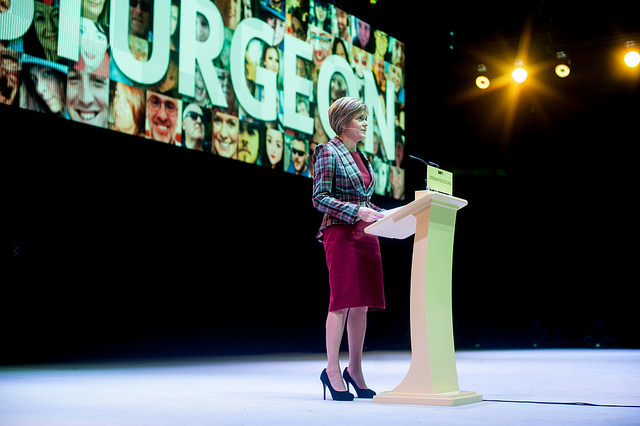
Against Ad Hocery: UK devolution and the need for consultation, consensus and consideration
Last month the Political and Constitutional Reforms Committee published a report on the future of devolution, in the wake of the Scottish Referendum. Here Dave Richards and Martin Smith pick the report apart and look at the implications for devolution in the UK. The newly published report on the Future of Devolution after the Scottish Referendum is a worthy attempt to bring some order to an often confusing and conflicting debate concerning where devolution goes after the election. Strikingly, the Committee notes that since the September 2014 Scottish Independence Referendum, rapid developments have been made in bilateral ways which pay little attention to the overall nature of the Union. What the Committee has identified is the extent to which devolution is happening in …

Forecasting the 2015 British general election: three weeks out
Forecasters, academic experts, journalists, pollsters and the betting markets have long been forecasting a seriously hung parliament with both major parties not only short of the 326 seats required for an overall majority but even forecast to get less than 300 seats. Meanwhile, an SNP landslide is expected in Scotland which would be hugely damaging for Labour and have major implications for the government formation process. If the forecasters and betting markets are right in their central forecasts then Con+LD+DUP combined will be short of a majority and so a Labour led government should form if they can secure the support of the SNP and probably others, including the Liberal Democrats, will be needed too: a potentially messy and unstable situation but also one where there is sufficient similarity in ideological perspective for policy agreement on plenty of issues.
But there is uncertainty associated with all the forecasts and some forecasters are trying to estimate the extent of that uncertainty, which in turn can be used to calculate probabilities of particular events (hung parliament, largest party, etc.)

The Loser Takes It All – The SNP after the referendum
If a political party were ever lucky enough to find itself in the SNP’s current position in Scotland, but across the entire United Kingdom, it would be heading towards the biggest landslide in British political history. The Nationalists are predicted to win around 45 per cent of the Scottish vote, giving them between 71 and 91 per cent of Scotland’s MPs.
The SNP offer candidates in only 9 per cent of Westminster constituencies yet are currently the British political party most certain of playing a role in the formation of the next government. The party’s current success comes against a backdrop of winning only 6 MPs in 2010, having as little popularity as the widely-loathed Scottish Conservatives as recently as 2013 and, in September of last year, leading a losing referendum campaign that forced a change in party leadership.
However, it is the referendum question that is now benefiting the SNP. The referendum campaign greatly increased support for independence, which is highly correlated with SNP voting in the General Election, as well as further dividing the Scottish party system, which was already split by attitudes towards independence. The closeness of the campaign has not extinguished hope amongst ‘yes’ voting Scots that independence remains a realistic possibility. Indeed, supporters of the SNP have become ever more fervent in their partisanship since September’s referendum.

‘Devo Manc’: ‘Northern Powerhouse’ or ‘Northern Poorhouse’?
Centralisation has certainly failed, but the promise of devolution to Greater Manchester is being massively hyped. Manchester is a great world city which has long divided observers. In the mid-nineteenth century, what was for de Tocqueville a ‘foul drain’ and for Taine ‘Babel built of brick’ was for the Edinburgh Review, by contrast, ‘foremost in the march of improvement, a great incarnation of progress’. Most recently, with ‘devo Manc’, the city of 1980s de-industrialisation and indie music has been transmuted into a symbol of post-industrial regeneration and devolved government. All this is being talked up as a matter of electioneering by the Treasury and Westminster politicians. After all, the coalition government must be seen to have a policy on ‘rebalancing …

The Cambridge Election Podcast
From the University of Cambridge comes ELECTION, a weekly politics podcast; asking the questions that no one else is in the run-up to the British General Election with the most interesting people inside and outside the political arena. Here below are the sixth and the seventh podcasts.
#6 – Rae Langton on Charlie Hebdo, hate vs free speech & blasphemy
What constitutes hate speech? Does the Press do more harm than good in our democracy? When should words become the government’s business? We put these questions to Professor Rae Langton – award-winning philosopher and the world’s ‘fourth most influential woman thinker’ – and discuss whether free speech can ever be reconciled with a need to suppress hateful voices. The team then discuss the fallout of Ed Miliband’s ‘second kitchen’, whether politicians can – or should – keep their families out of the media spotlight, and the lessons from the Israeli election result.

The Great Charter of Liberties
Looking at the distance between the Westminster parliamentary system and those to whom elected representatives are ultimately accountable, the Chartists had a point – in fact, at least six points. Magna Carta: Law, Liberty, Legacy. The coincidence of the British Library’smagnificent exhibition with a general election campaign is bound to tempt political parties to claim a particular affinity with Magna Carta, or more precisely with what they believe it embodies. As David Carpenter’s new Penguin Classics edition demonstrates (together with the review of it that Peter Linebaugh contributed to this series) – this is a subject still wide-open to contest. Yet this in no way diminishes the significance of previous interpretations, especially those that helped shape past political movements. That great popular movement of the …

Alan Rusbridger: The world after Snowden
The debate over the impact of Edward Snowden’s intelligence leaks has been obscured by “muddle and fog”, particularly in the United Kingdom, according to Alan Rusbridger. The Guardian’s editor-in-chief said the lack of response from British politicians, journalists and the public following the revelations was “very frustrating”. Politicians in the UK have found the subject “toxic”, complex and difficult to discuss, but the issues are too important to be ignored, Rusbridger said. “The penny has dropped recently that, love or hate Edward Snowden, he has laid out a huge canvas of issues that concern us all,” he said. In a lecture, 21st Century Surveillance State: Implications of the Snowden Revelations, at the University of Oxford this week, Rusbridger told his audience it was time to move the debate …

Digital rights and freedoms: Part 2
More than rights, a set of guiding principles is needed to counterpose to the reigning ideals of ‘security’, ‘growth’ and ‘innovation’. Alternative ideals, perhaps, such as democracy, health and environmental sustainability? See part one. The net has the potential to revolutionize democracy with an informed citizenry empowered to deliberate and decide on key issues. Yet current trends strengthen anti-democratic forces. In addition to concerns over privacy, there is an urgent need to address how the public realm is being hollowed out by corporate interests and advertisers. The ideal of democracy presupposes a shared public sphere in which citizens can construct, debate and decide on collective projects. This requires access to quality information and while the net has certainly increased the …









